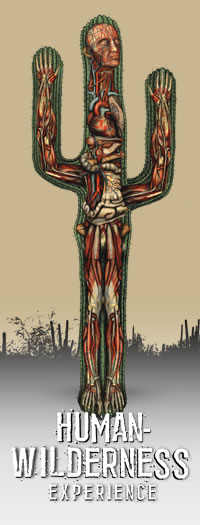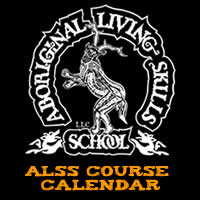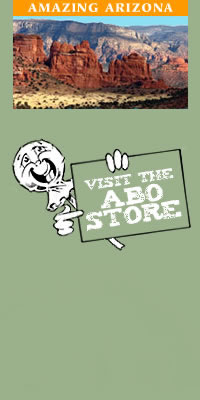Commonly asked questions regarding our School
by Cody Lundin
- What is ALSS?
- Why is it important to teach people wilderness survival and primitive living skills?
- Why did you create ALSS?
- Where is Prescott, Arizona and how do I get there?
- Because your school is located in Arizona, don’t you only teach desert survival skills?
- Can I visit your school?
- Do you teach college credit courses in wilderness survival?
- What makes your school different from other outdoor survival schools?
From the ALSS Mission Statement:
“The Aboriginal Living Skills School, LLC is dedicated to helping preserve and enrich lives through the preservation and instruction of traditional wilderness skills, primitive living and modern outdoor survival skills, and home preparedness. We seek to increase the holistic development and common sense of humanity through hands-on experiences with the natural world and aboriginal traditions.” top
Why is it important to teach people wilderness survival and primitive living skills?
Our modern world represents but a tiny fraction about how people have lived on this planet for thousands of years. Common sense skills relevant to the very survival of every culture on Earth have been virtually eliminated from the gene pool in a few generations.
Self-reliant skills benefit people in many ways. Some of the perks are obvious, such as surviving a wilderness emergency, natural disaster, or preventing a mishap from occurring in the first place through educated prevention and planning.
All self-reliant skills build upon the art of “doing more with less.” Many people come to us because they are tired of carrying a 70-pound backpack into the woods. To take a broader view, in a modern world heavily dependent on technology with seemingly no plan on what to do if that technology fails, knowing how to protect you and your loved ones brings welcome independence and peace of mind.
Other training benefits are more subtle, but overall, no less important. All self-reliance skills profoundly increase your self-confidence, common sense, and awareness of how Mother Nature and human nature work. In the world of survival and life itself, there is no substitute for a positive attitude. Working with others accomplishing time-honored activities enhances group dynamics, cooperation, and creative problem solving skills in an honest, no-nonsense fashion allowing you to better understand yourself and those around you.
Self-reliance skills clearly illustrate what you need to live. Understanding what is needed to live, instead of “living to want,” is incredibly liberating and will release you from much fear, anxiety and uncertainty. You may find yourself becoming more and more anchored within the truth of common sense and simplicity, and find great pleasure and gratitude in the tiniest things. You will start to develop an increased appreciation, understanding, and awareness toward our environment, reviving an ancient thought that was fully aware that when one element in a cycle was disturbed, it caused an imbalance within the entire living system.
Aboriginal living skills and survival skills were used throughout prehistory and are the common heritage of humanity. Like eating and breathing, indigenous skills reinforce what people all over the world have in common. Watching a big city executive make fire with sticks and instantly rekindle a primal, child-like part of their life is quite special to watch.
Although we at ALSS share and teach “physical skills,” the impacts of these skills reverberate through mental, emotional, and spiritual worlds as well. Coming to an understanding of “the sacred” as appreciated by aboriginal peoples is a liberating and transforming experience. top
I have been interested in doing more with less from childhood. Not once growing up, however, did I think I would be teaching self-reliance skills to others. Learning and practicing skills was simply a part of my lifestyle, an extension of who I was. Although I don’t remember my first teaching engagement, which was at best, extremely informal, the more I taught, the better response I had. Encouraged at people’s transformation in how they looked at nature and themselves, I created my first “brochure” from a photo copied piece of colored paper in 1991. Armed with the brochures and scotch tape, I plastered every bulletin board, phone booth, and telephone pole in town. Although many years of experience, mistakes and refinements have happened since, the essence of my school remains the same, to offer people an honest look at the wilderness within themselves and without. top
Where is Prescott, Arizona and how do I get there?
Prescott is located in central Arizona in the geographic province known as the Central Arizona Uplands. This diverse landscape includes pine/oak forest, pinion/juniper woodlands, short grass prairie, chaparral, and several riparian habitats. When gold was discovered in the Bradshaw Mountains in the late 1880’s, people were quick to make Prescott the Territorial capital of Arizona . While the town itself has grown by leaps and bounds, Prescott ’s surrounding areas offer some of the most scenic and remote country in the state.
Prescott is situated less than two hours north from Phoenix Sky Harbor International Airport . Sky Harbor features ground shuttles to Prescott operating several times per day. In addition, Prescott has its own airport with sky shuttle service available from Sky Harbor International airport daily as well as offering landing opportunities for your personal or company aircraft. For those preferring to drive, Interstate 17 and Interstate 40 offer quick access to the Prescott area. top
Because your school is located in Arizona, don’t you only teach desert survival skills?
Absolutely not! Amazing Arizona has more geographical diversity, in the shortest drive time, of anyplace in North or South America and is home to ten plant communities, three geographic provinces, and all four North American deserts offering you the ultimate outdoor training landscape. Arizona allows us to teach courses as varied as winter camping and desert survival ensuring the flexibility to meet your needs. top
We operate several field base camps and a private wilderness skills training facility, but by our choice, we don’t have a formal “school room” or store for you to visit. We prefer to keep our business as simple as possible. Aside from certain college credit courses (below), our classroom is the outdoors. top
Do you teach college credit courses in wilderness survival?
I developed and taught the program curriculums in outdoor survival skills and primitive living skills for both Yavapai College and Prescott College in the early 1990’s. I typically teach three courses for Yavapai College: Outdoor Survival Skills, Winter Survival Skills and Aboriginal Living Skills. All are two-credit courses. In addition, I lead a field based orientation for the Leadership Center for faculty and staff development at Yavapai College.
I’m also a faculty member at the Ecosa Institute, a sustainable architectural school, where I lead their students on a field based orientation in Southwestern indigenous living skills to kick off their semester program. top
What makes your school different from other outdoor survival schools?
I founded the Aboriginal Living Skills School not as a job, but as an extension of my lifestyle. Each ALSS experience offers you far more than a simple “black and white” run down of outdoor skills- we also offer you the mental and emotional mind set to go with it. Skills alone become useless trivia without the power of "educated intention" to drive them home. Self-reliance is our passion and we live what we teach.
Being locally owned and operated, our courses retain a flavor and intimacy long vanished from larger schools. Although we are a small school and choose to remain so, we’re big enough to handle most all of your training needs. At ALSS, our focus remains on getting better, not getting bigger. Feel free to view our training advantages and call us if you have any questions.
In summary, whether you’re building a custom off-the-grid home, pitching a Gortex tent, or selecting the best cave for the night, we offer you the training experience that gives your self-reliant strategy an educated choice. top




